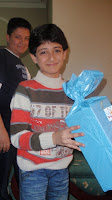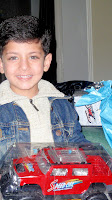
The Middle East designated the first Friday in April as "
 Orphan Day" when special attention is paid to children who have lost one or both parents. We set out early to brighten the day for a few of Iraq's orphans here in Amman.
Orphan Day" when special attention is paid to children who have lost one or both parents. We set out early to brighten the day for a few of Iraq's orphans here in Amman.First we went to the toy shop at our local mall and had a small shopping spree - snazzy remote-control cars for the boys, dolls for most of the girls, beading kit for an older girl, and toddler toys for the youngest. The friendly shop keeper wrapped them all in bright metallic paper while Maha put the names on the tags...



...We called our favorite taxi driver, Khalid, and set off to deliver the gifts to four families whose children had all lost their fathers.
We had not met these families yet but they had been recommended by social work volunteers from another NGO as being "needy" so we were a little surprised when we entered the building where the first family lives - it was quite beautiful - certainly much nicer than the types of dwellings most Iraqi families live in.

We brought gifts for three brothers: Taher - 13, Ali - 9, and Hussein - 5. Their mother, Eman, met us at the door and invited us in graciously. I was immediately struck by how humbly dignified she was - and how deeply sad she looked.
Eman and her husband were from different sects - as was very common before the US invasion and it was basically "not an issue". But afterwards, as neighborhoods and districts began dividing by sect, their neighborhood became Shia-dominated and her husband began receiving threats after one of their neighbors told the militia he was Sunna.
They first came to Jordan in 2006 and only stayed for 6 months before going to Syria to get medical treatment for Hussein who has a blood disease. They were in Syria only one month when her husband returned to Baghdad to try to sell the shop he owned there. He never returned. Militia shot him multiple times in the head.
The family returned to Baghdad because the hospital would not turn over his body unless she herself came to get it. The militia had taken over her husband's shop and their home. They lost everything. Tahir, only 10 years old at the time, became the target of threats. He received a note wrapped around a bullet - the message was clear. His life was in danger.
Eman moved her family from area to area of Iraq for awhile, back to Syria, again to Baghdad and then to Jordan a year ago when they were finally granted visas . The eldest boy, Tahir said that it's been very difficult for him to get his education while living on-the-run but he told us that he studies extra hard and his grades are good.
Eman told us that they receive no assistance from UNHCR or NGOs; Collateral Repair Project is the only organization that has offered them anything. Tears well up in her eyes as she tells us they rely on charity to survive. The nice apartment belongs to one of her husband's business colleagues and he lets them stay there rent free. Family in Iraq helps sometimes by sending money. One of her husband's brothers pays for the kids school fees. They had been a wealthy family before the invasion. Eman has a difficult time accepting charity from even her family but must to survive.
I ask Tahir what he remembers about Iraq. With amazing calm he told me:
"I was in school, in my classroom and we heard the sound of planes. There was huge sound and they dropped a missle on our school. All I saw was blood and more blood and all of us were crying. The missle killed all of the kids in the classroom where it directly hit. All I got was shrapnel in my legs" He says he has 'bad' dreams sometimes.
Hussein wants to return to Iraq and always asks his mom, "When can we go back to our house in Baghdad?"
Eman tells us she found the boys playing in their bedroom the other day, one with his head wrapped like a militia member, another with a toy gun, and the other with his eyes blindfolded and his hands tied together.
She tells us that they received an offer to resettle to the US but she refused it. She said she cannot go there - knowing no-one - especially since her health is bad. She has a blood clot in her brain and the doctor told her that if there is a second one, she will likely die. She cannot work and needs medical care. Eman knows she will not get support she needs in the US.
Although these kids escaped the violence of Iraq, their loss and the horrors of war will follow them wherever they go.
We had not met these families yet but they had been recommended by social work volunteers from another NGO as being "needy" so we were a little surprised when we entered the building where the first family lives - it was quite beautiful - certainly much nicer than the types of dwellings most Iraqi families live in.

We brought gifts for three brothers: Taher - 13, Ali - 9, and Hussein - 5. Their mother, Eman, met us at the door and invited us in graciously. I was immediately struck by how humbly dignified she was - and how deeply sad she looked.
Eman and her husband were from different sects - as was very common before the US invasion and it was basically "not an issue". But afterwards, as neighborhoods and districts began dividing by sect, their neighborhood became Shia-dominated and her husband began receiving threats after one of their neighbors told the militia he was Sunna.
They first came to Jordan in 2006 and only stayed for 6 months before going to Syria to get medical treatment for Hussein who has a blood disease. They were in Syria only one month when her husband returned to Baghdad to try to sell the shop he owned there. He never returned. Militia shot him multiple times in the head.
The family returned to Baghdad because the hospital would not turn over his body unless she herself came to get it. The militia had taken over her husband's shop and their home. They lost everything. Tahir, only 10 years old at the time, became the target of threats. He received a note wrapped around a bullet - the message was clear. His life was in danger.
Eman moved her family from area to area of Iraq for awhile, back to Syria, again to Baghdad and then to Jordan a year ago when they were finally granted visas . The eldest boy, Tahir said that it's been very difficult for him to get his education while living on-the-run but he told us that he studies extra hard and his grades are good.
Eman told us that they receive no assistance from UNHCR or NGOs; Collateral Repair Project is the only organization that has offered them anything. Tears well up in her eyes as she tells us they rely on charity to survive. The nice apartment belongs to one of her husband's business colleagues and he lets them stay there rent free. Family in Iraq helps sometimes by sending money. One of her husband's brothers pays for the kids school fees. They had been a wealthy family before the invasion. Eman has a difficult time accepting charity from even her family but must to survive.
I ask Tahir what he remembers about Iraq. With amazing calm he told me:
"I was in school, in my classroom and we heard the sound of planes. There was huge sound and they dropped a missle on our school. All I saw was blood and more blood and all of us were crying. The missle killed all of the kids in the classroom where it directly hit. All I got was shrapnel in my legs" He says he has 'bad' dreams sometimes.
Hussein wants to return to Iraq and always asks his mom, "When can we go back to our house in Baghdad?"
Eman tells us she found the boys playing in their bedroom the other day, one with his head wrapped like a militia member, another with a toy gun, and the other with his eyes blindfolded and his hands tied together.
She tells us that they received an offer to resettle to the US but she refused it. She said she cannot go there - knowing no-one - especially since her health is bad. She has a blood clot in her brain and the doctor told her that if there is a second one, she will likely die. She cannot work and needs medical care. Eman knows she will not get support she needs in the US.
Although these kids escaped the violence of Iraq, their loss and the horrors of war will follow them wherever they go.










